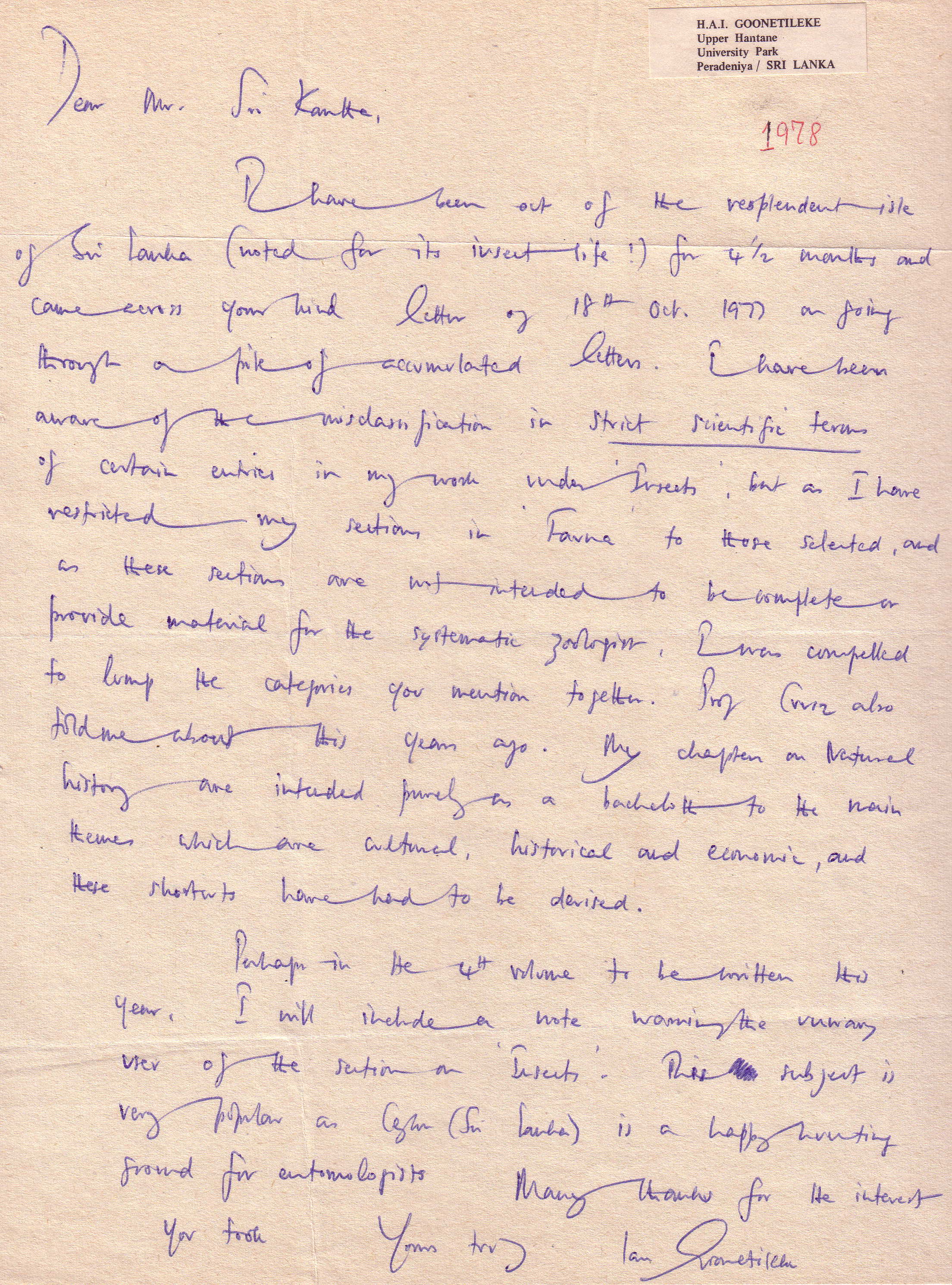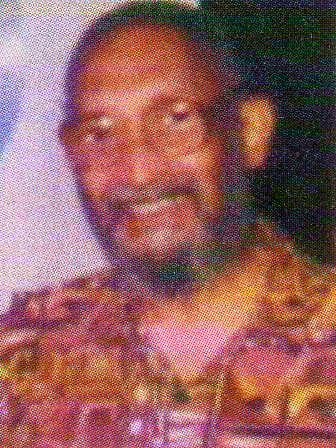by Sachi Sri Kantha, July 14, 2013
Anti-Tamil riots of July 1983
Eminent bibliographer H. A.I. Goonetileke (1922-2003; long affiliated to the University of Peradeniya as its chief librarian) was one among the handful of contemporary Sinhalese scholars whom I respect very much. His bibliography on the anti-Tamil riots of July 1983 appeared in the Race & Class (London) journal as a 35 page compilation in 1984. To commemorate his tenth death anniversary and also the 30th anniversary of the anti-Tamil riots of July 1983 which he had focused on, I provide the published complete text of this bibliography in a PDF file.
HAI Goonetileke 1984 bibliography of 1983 pogrom in Race and Class
In an introduction to this compilation, Ian Goonetileke offered the following details. “The bibliography is basically in two sections: A – ‘The national question: perceptions and performance’, and B – ‘July 1983: outrage and outcome’. Part A is preceded by a brief list of 34 basic historical works which provide a broad framework of historical understanding for the initiate into the main strands of Sri Lanka’s evolution from a pre-feudal society into a modern nation state. Part A, which comprises 167 entries, constitutes a significant and relevant point of entry into the intricacies of the Tamil question in Sri Lanka vis-à-vis the impact of the Sinhala-Buddhist majority. Part B, containing 405 entries, represents a wide range of responses to the cataclysm of July 1983…”
Though I was at the University of Peradeniya for four years (1977-81) as a postgraduate student and as a temporary assistant lecturer in biochemistry, I never had the opportunity to meet him even once. But, Goonetileke’s magnum opus, ‘Bibliography of Ceylon’ (volumes 1 and 2) was like a Bible for me. Whenever I had free time, my hands would automatically pick up his work and I’d religiously copy down pertinent entries in my note book.
This resulted in me writing a letter to him. It was dated October 18, 1977. Luckily, I have preserved a draft of this letter in my files. It reads as follows:
“Mr. H.A.I. Goonetileke,
Chief Librarian.
Being a postgraduate student, I had occasion to glance thro’ your invaluable compilation ‘Bibliography of Ceylon’. Though I gained a lot from it, I like to point some compilation errors which had cropped up in one section – natural history, under the topic ‘Insects’. You had included the following entries, which actually shouldn’t come under it. They are: numbers 1296, 1312, 1312a, 1312b, 1326, 1329, 1330, 1335, 1338, 1355, 1356, 1360, 1361, 1366, 1369, 1374a and 1379.
It would have been better, if you would have listed these entries, into another separate heading ‘Invertebrates’, because these entries refer to diverse animals like polychaetes (worms), pedipalps, centipedes, arachnids, helminthes, nematodes, ticks, spiders, which are distinctly different from insects.
Hope you’ll take up this bit of constructive criticism with open heart.
S. Sri Kantha”
 To my surprise, I did receive Goonetileke’s response few months later in 1978, in an undated letter. I was impressed by his cursive penmanship, and the trouble he had taken to reply me (then, a lowly junior in the pecking order of Peradeniya academic temple). Luckily, I had saved his 35 year-old letter and I reproduce it in a scan. The contents of Goonetilake’s letter are as follows:
To my surprise, I did receive Goonetileke’s response few months later in 1978, in an undated letter. I was impressed by his cursive penmanship, and the trouble he had taken to reply me (then, a lowly junior in the pecking order of Peradeniya academic temple). Luckily, I had saved his 35 year-old letter and I reproduce it in a scan. The contents of Goonetilake’s letter are as follows:
“Dear Mr. Sri Kantha,
I have been out of the resplendent isle of Sri Lanka (noted for its insect life!) for 4 months and came across your kind letter of 18th Oct. 1977 on going through a pile of accumulated letters. I have been aware of the misclassification in strict scientific terms of certain entries in my work under ‘Insects’, but as I have restricted my sections in ‘Fauna’ to those selected, and as these sections are not intended to be complete or provide material for the systematic zoologist. I was compelled to lump the categories you mention together. Prof. Cruz also told me about this years ago. My chapters on natural history are intended purely as a backcloth to the main themes which are cultural, historical and economic, and these shortcuts have had to be devised.
Perhaps in the 4th volume to be written this year, I will include a note warning the unwary user of the section on ‘Insects’. This subject is very popular as Ceylon (Sri Lanka) is a happy hunting ground for entomologists. Many thanks for the interest you took.
Yours truly,
(signed) Ian Goonetileke”
Coda
In retrospect, I’d acknowledge that bibliographer Ian Goonetileke did influence me directly. After receiving his letter, I was enticed to prepare a detailed ‘Bibliography of Sri Lankan Entomology’ while being a temporary assistant lecturer at the Faculty of Medicine. I did receive a grant from the National Science Council of Sri Lanka for a paltry sum of 500 rupees for this project. Somehow, due to pressure of simultaneously pursuing my master’s degree research and carrying a teaching load, I had to abort this project in half way.
Somehow, the bibliography-mania kindled by Goonetileke kept burning in my psyche. It did result in my first book in English published in 1991. From entomology, I switched to medical anthropology, and the outcome was, ‘Prostitutes in Medical Literature: An Annotated Bibliography’. (245 pages). I picked this theme because I succeeded in finding an American publisher without an agent, as AIDS-disease was a big topic then. Though I have yet to receive a royalty check from my publisher (even after 22 years!), I have the satisfaction that internet searches reveal that the book is still marketed – sometimes for a higher price than the original publication price in 1991. Who said that creative accounting is unknown, among American publishing industry?
For my personal library I did purchase the five volumes of Goonetileke’s magnum opus, ‘Bibliography of Ceylon’ for approximately 350 US dollars from his Switzerland publisher in 1992. This had enabled me to keep searching and collecting published literature on themes which Goonetileke had negligently ignored on Sri Lankan culture.
I was also influenced by Ian Goonetileke’s traits of academic integrity, academic freedom and standing up to ‘silencing of dissent by intimidation’. As a tribute to him, I provide below his thoughts which he had recorded in one paragraph in the preface to the volume IV of his magnum opus.
“I finished writing the main text of these volumes [i.e. volumes IV and V] on July 12th 1979, and at the end of the same month I ‘retired’ involuntarily from the post of Librarian, University of Peradeniya, Sri Lanka. In the two years preceding, the Vice Chancellor of my University (the twelfth since Sir Ivor Jennings, who first gave me my opening into academic librarianship) had chosen to instruct his Librarian in the arts of library administration, and subjected me to increasingly inappropriate and perverse constraints. Since my attempts to draw attention to certain eternal verities of administrative self-reliance and academic freedom in order to alleviate the deepening crisis and to resolve the unfortunate deadlock, succeeded only in sharpening the antagonism, I thought it best to withdraw from the inspirational centre of my professional career. I left a university to which I had committed my vocational enterprise and initiative for twenty-seven years because I wished to preserve my powers of intellectual autonomy and moral choice. In it, sadly, recent trends had led to a loss of individualism, increasing alienation, an indifference to social issues and human values, and the silencing of dissent by intimidation.”
For record, I should inform that the unnamed Vice Chancellor mentioned by Goonetileke in the above paragraph was Prof. Bernard Leslie Panditharatne, a geographer.

It is indeed thoughtful and nice of Sachi to have given us the opportunity to remember and reflect on one of the finest of human beings
Subra Jayahanthan
Much appreciated. Very informative piece.